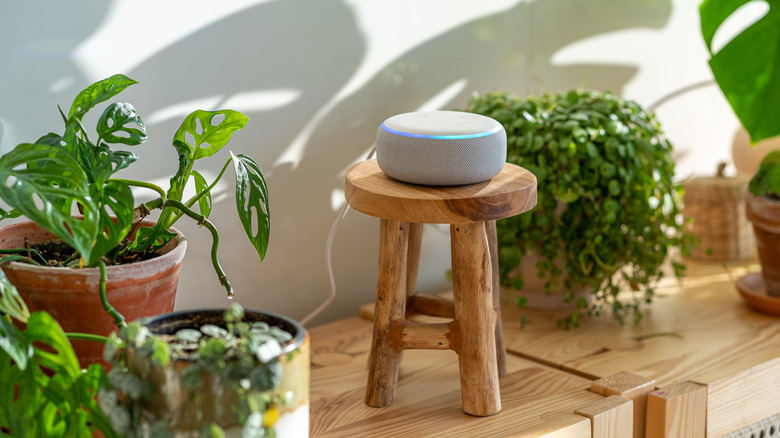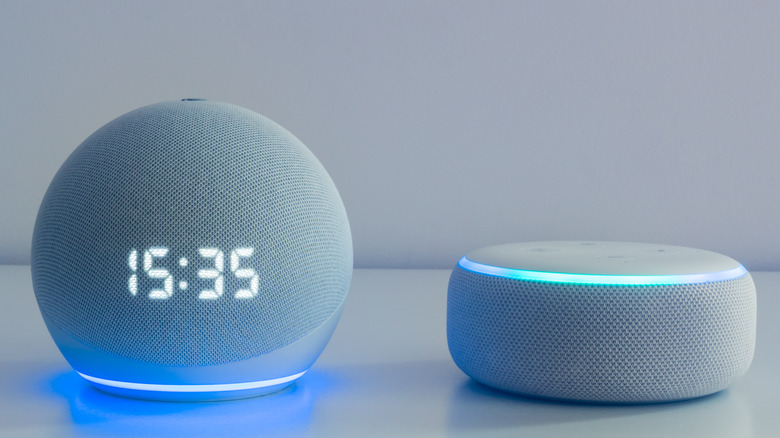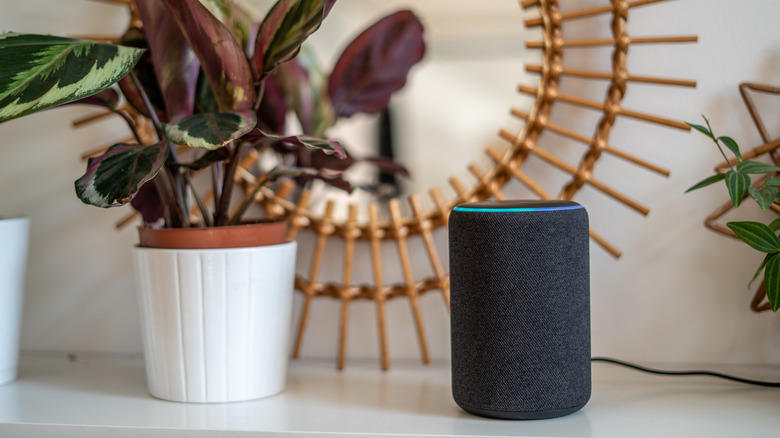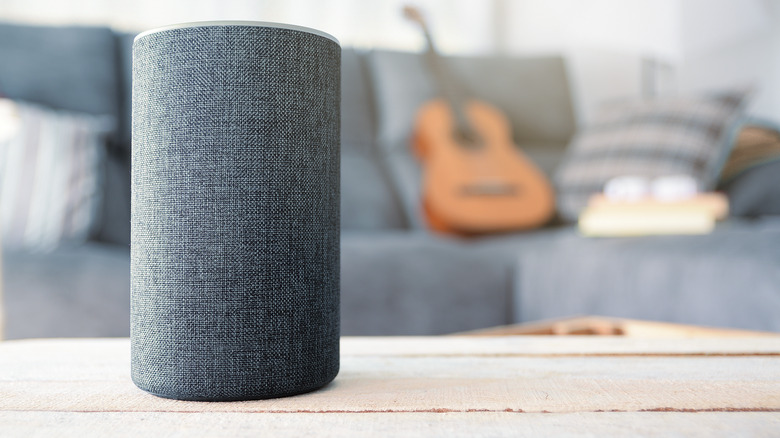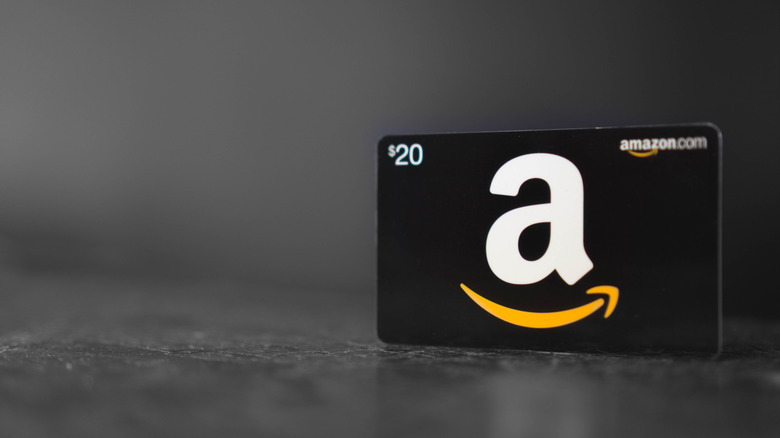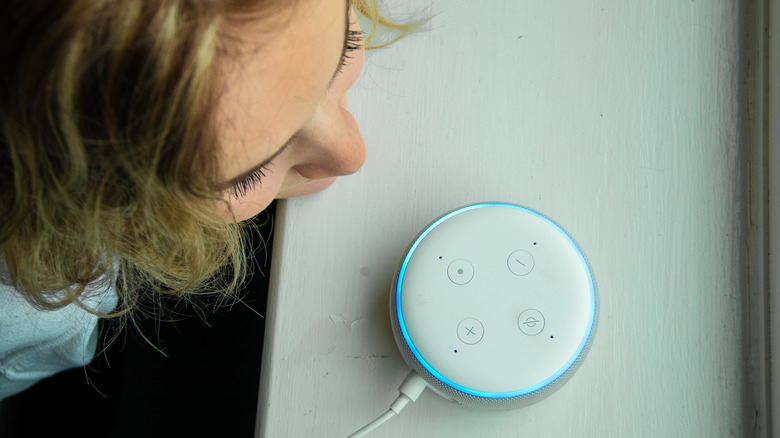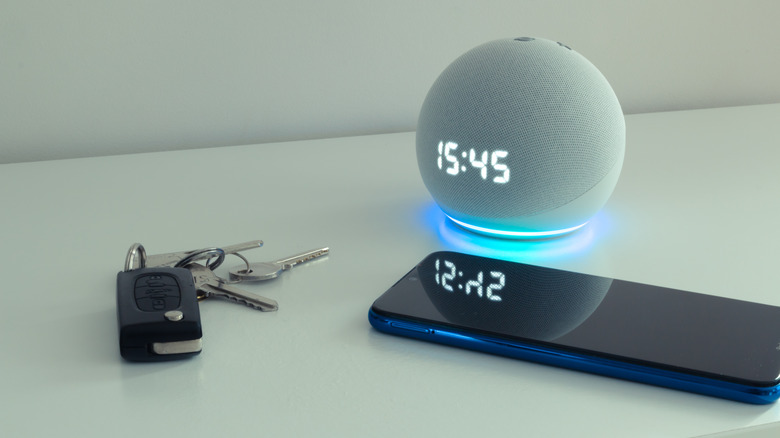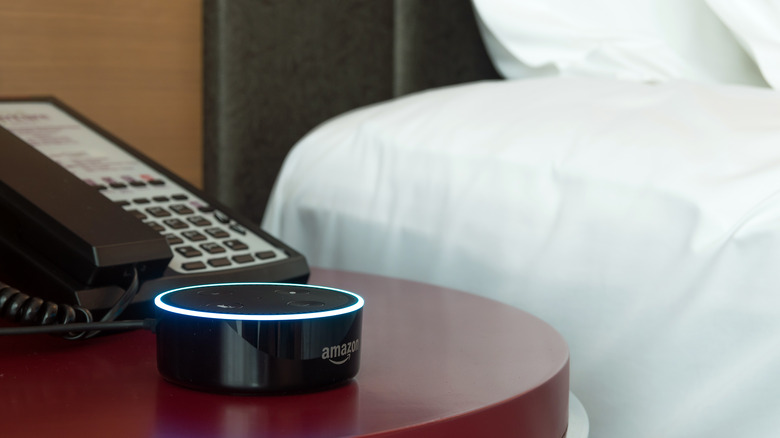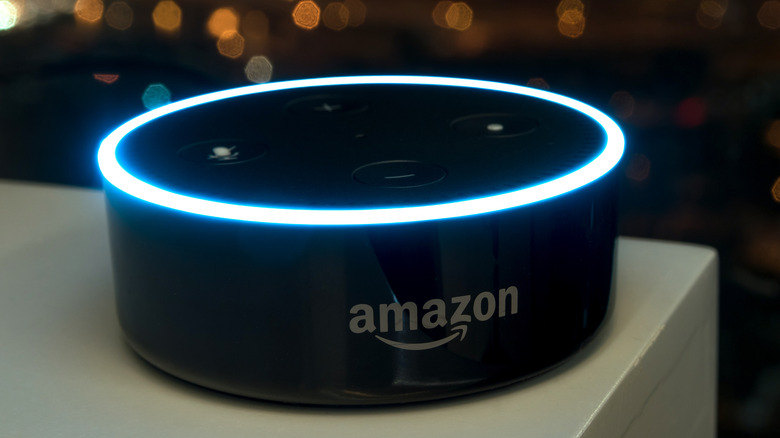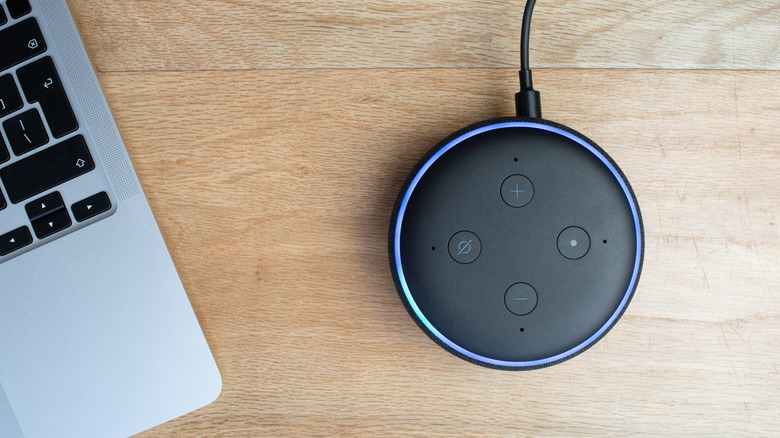The Hidden Downsides To Alexas
We may receive a commission on purchases made from links.
We let Alexa into every part of our lives. Is this a good thing? According to The Verge, research found that all of the information about ourselves and our daily lives we voluntarily give to Alexa (and Amazon, by default) is shared with 41 other companies. These companies use our information to tailor ads that are just right for us based on our likes, dislikes, recent searches, and even shopping information, encouraging us to spend more than ever.
We give our digital assistants so much access to our lives that the public rarely second-guesses an Alexa-based elder care service that surrenders plenty of sensitive health information to the app. Instead, it's seen as an advance in accessible health care (via TechCrunch). It's easy to understand why this happens because Alexa is so convenient. She can tell us the weather and local news while getting ready in the morning. Alexa can set timers, adjust our thermostats, and even help us auto-order our favorite household essentials. This convenience and progress come at a high cost because there is also a dark, hidden downside to the Alexa in your home. Let's take a look.
Alexas are receptacles for germs
Most of us probably wouldn't name our smart devices in the top 10 things we tend to clean around the house. However, we should definitely pay more attention to our Alexas on cleaning days since devices can become filthy. The small, interconnected holes that makeup Alexa's speaker system act as magnets for dirt, grime, and sometimes even bugs.
According to CNET, the amount of debris caked into our smart device speakers can impact their sound quality over time. Even if your Alexa isn't visibly dirty, it's time to pay more attention to cleaning if it starts sounding a bit muffled. Your best bet is to use the items you might use to clean your laptop. These include a microfiber cloth, a lint roller, and even a small vacuum with a refined attachment if there is a lot of dust build-up. It's best to wipe down your Alexa at least once a week. You can use coffee filters to dust off your electronics.
Alexas can teach children poor manners
Kids can be a bit rude and demanding toward smart devices. According to Quartz, Alexa doesn't have any feelings, which means the device will put up with just about any type of behavior. For example, you don't have to say please when you ask Alexa to do something. You don't have to use a kind tone, either. If you use a voice that wouldn't fly in most peer-to-peer social interactions, Alexa won't mind. Even if you curse at it, the device will just say it doesn't understand.
These are not the best conditions for parents trying to teach their children basic manners. The problem has led some couples to tell their children that Alexa won't listen to them if they aren't polite. Unfortunately, it's easy for kids to test this theory and find it's not true. If you are a parent with an Alexa in your home, you have a bit more work ahead of you to ensure your kids don't grow up treating their peers like electronic assistants.
Students can use Alexa to cheat on schoolwork
Even if your child is polite to Alexa, there are other problems that parents of school-age children face when they have an electronic assistant in their house. While a high schooler might not be able to get Alexa to write their term paper, an elementary school student can use the device to get answers to their homework instantly.
It's almost too easy to ask Alexa for the answer. According to Kim Komando, a six-year-old from New Jersey used Alexa to cheat on his math homework. In the now-deleted clip, the boy asks Alexa, "What is five minus three?" instead of finding out the answer by himself. It would certainly be easier to complete the most basic math, English, and history worksheets with the entire internet at your disposal. Because of this, parents who have an Alexas need to be extra careful about how their school-age children use the device.
You have to purchase accessories to make Alexa portable
You can't take Alexa on the go without spending more money. Sure, you can purchase plenty of cheap Bluetooth speakers if you want to listen to music on the go, but Alexa remains a stationary part of any household. According to Amazon, the Echo (generations one and two), Echo Plus, Echo Dot, Echo Show, and Echo Spot are all corded devices. So, they always need to be plugged into an outlet and can't be charged up and carried with you.
If you want to move Alexa to a different room in your house, you need to unplug it, move it, then set it all up again. However, if you really need to take your Alexa on the go, there are after-market devices you can buy to transform it into a portable speaker. However, they aren't cheap and run at about $40 (via TechRadar).
Human error can leak your private information
Alexa owners have had their private files sent to strangers. According to English reporting by NPR, a German resident requested his Amazon data which the company was required to send to him under a European Union law. Imagine his surprise when he received over 1,700 audio recordings of a stranger speaking to their Alexa. The recordings contained data like conversations between a couple, questions about the weather, and even shower sounds. Potential privacy breaches like this for Alexa owners are scary to think about, but they do happen.
In another instance, an American couple's Alexa recorded an entire conversation and then sent it to a random number in their address book, completely unprompted (via The Guardian). While Amazon has said that these incidents are isolated and traced back to human error, consumers should be wary of these claims. When purchasing an Alexa, be mindful of where you place the smart assistant in your home. Be aware of any private data shared near the device since you never actually know who might end up overhearing.
Alexa sometimes suddenly stops listening
Sometimes, Alexa can ignore you completely. This habit can be extremely annoying when you are just trying to ask Alexa a simple question. While users concerned about data concerns might breathe a sigh of relief that Alexa doesn't seem to listen, it can be frustrating for others who want to know the weather forecast or who was president in 1971. According to MakeUseOf, if Alexa suddenly stops responding to your voice (as it is prone to do), you can take a few steps to get it back on track right away.
The easiest way is to unplug Alexa, wait a moment, then plug it in again. However, if this doesn't reset the device, you can do a hard reset by holding the microphone and volume buttons down together for about 20 seconds. You might need to use a pen or paper clip to reach the embedded reset button on some older models. Constantly troubleshooting and resetting your Alexa assistant is a downside of owning one.
Children can go on accidental shopping sprees with the Alexa
Being a parent in the modern age comes with unprecedented challenges. These difficulties are especially true if you own an Alexa, as kids can add items to an online shopping cart with a simple voice command if you're not careful. According to CNET, the only built-in checkpoint to prevent accidental purchases through Alexa is saying "yes" when prompted to make the purchase. As kids become more and more tech-savvy, plenty of children would happily reply in the affirmative.
To avoid spending thousands, you have to be proactive and go out of your way to set up additional security features on your device. The easiest way is to use the Alexa app to disable the feature altogether. While it might be a little frustrating to use the Amazon app to finalize all purchases, you can be sure that they won't be accidental. Or, if you like the feature, you can also set a four-digit pin code for purchases. You just have to make sure your children don't find out what it is.
You could be potentially surrendering privacy for Alexa's convenience
Does Alexa allow Big Brother into our homes? According to The Guardian, this is a common debate. Those wary of technological voice assistants are often thought of as old-fashioned, while those who use them without a second thought are considered reckless with their privacy. However, those in favor of them are well into the hundreds of millions (via The Verge). In reality, the situation is well out of the hands of those who are reluctant to adopt new technologies.
Even human contractors brought in to audit Alexa's helpfulness note that the voice clips they review, while anonymous, would be embarrassing or otherwise harmful to those speaking should they be released. They hear things like gossip, medical information, and even intimate encounters. Allowing a device, however helpful it might be in other areas of our lives, to have this much data about us, knowing that data isn't necessarily secure — is terrifying.
Someone can steal your car with Alexa's help
If your car links to your at-home devices, it just got easier for thieves to steal it. Yoni Heilbronn, chief marketing officer at Argus Cyber Security, told The New York Times that "cars are a highly lucrative target. People are inside these vehicles moving at high speeds, and cars cost a significant amount of money." If your car's Bluetooth system connects to your Alexa, it's easy for a hacker to perform several attacks. These could be simply annoying, like rolling down your windows when you prefer them up. However, the hacks can quickly turn more sinister.
It's easy enough to unlock your car's doors with remote access, then use any links between your vehicle and your home's smart device to cause more harm, like a break-in. It works the other way, too. Certain vehicle manufacturers have already created links between your home Alexa and your car, allowing things like a remote start. While intended to help warm up your vehicle on chilly days, it's also the perfect opportunity for a thief to make a quick getaway.
Alexas and other smart devices can be used in domestic abuse situations
Unfortunately, there are rising reports of abusers using smart home devices to assert further control over their victims. According to the BBC, an abuser could easily torment others in a household with the help of Alexa. They just need access to the Alexa app to purchase items without consent using saved payment methods. If Alexa has home security features turned on, abusers can also spy on their family members by knowing their whereabouts within the home. The person would know if anyone enters or leaves because Alexa would report the sensor activating on the door.
It's even more dangerous if the abuser is Alexa's account administrator. Other family members would be hard-pressed to disable the features making them unsafe. As Louise Howard, professor of perinatal psychiatry at King's College London, notes to BBC, "domestic violence is endemic," and unfortunately, as technology continues to develop, so will its misuse.
Alexa can be slow to respond
We've all been there. We want to know the weather forecast for the afternoon before walking out the door, so we ask our digital assistant with our hands hovering over the umbrella. Then, we have to stand there for ages trying to get an answer. Sometimes, just asking Alexa a quick question can seem to take years. According to SmartHomeOwl, there are a few reasons why your Alexa can't seem to think straight.
The most common is that your Wi-Fi signal isn't strong enough for her to communicate with the cloud to fetch the answer to your question. In addition, sometimes your signal is not strong enough, or you don't have enough bandwidth for Alexa to work. Maybe it's time you start thinking about buying a Wi-Fi router. Or, sometimes, Alexa's cable isn't correctly plugged in. However, if you've already troubleshot all of these, it could be that Alexa's software needs to be updated because it has a technical bug. This problem, in particular, is a rather annoying downside of owning an Alexa.
Alexa can be hacked and turn your home hostile
Unfortunately, it's possible to hack any device, leaving you and your family vulnerable to unwanted cyber invasions. In addition to using Alexa to monitor your coming and going patterns to plan a future break-in or simply lewdly watch you without you knowing, hackers can change elements of your home.
According to research by Royal Holloway, University of London on arXiv, once a hacker gains access to your Alexa, they can turn your home into a hostile environment. If you use Alexa to control your lights, this third party can turn your lights on and off, even flashing them for maximum annoyance. They might be able to lock and unlock your doors to keep you locked out or even easily let themselves in. In addition, if you use Alexa to control your thermostat, a hacker can crank up the heat, making your home nearly an uninhabitable temperature.
Alexa can play host to insects
Ants are known to call Alexas their home. If you don't find out about the problem soon enough, it ruins the device ... and leaves you with a long-lasting ant problem in your house to boot. According to Live Science, all ants reproduce quickly, but the particularly invasive species known as Crazy Ants outnumbers all other ants in the United States 100 to one. This particular kind of ant doesn't build its own system of tunnels like other species. Instead, Crazy Ants seek out pre-built, spacious areas to live in, just like the inside of your brand new Alexa.
You can head off an ant invasion (or any other type of insect) by keeping your Alexa and surrounding area clean. However, if some ants get inside, there are still a few things that you can do before things get out of hand and the device gets ruined. If you decide to use chemicals to get rid of ants, spray them near your Alexa, not directly onto her. In addition, you can use ant bait to lure the animals away from your device (via Pest Samurai).
You'll always need to purchase an upgrade or replacement
Whether you want one for every room or just the latest model, Alexas will soon take over your life and wallet. According to Reader's Digest, common user behaviors can significantly shorten the life of an Alexa. If you get her a little wet, use too many third-party accessories, don't clean properly, or even let her get too warm, she could stop working before you know it. If you find using an Alexa particularly convenient, you're on the hook for a new one a lot sooner than you thought you would be.
In addition, even if the Alexa you bought for your kitchen is working great, you'll soon want an Alexa for your bedroom and probably your home office, too. That's the tricky bit about Alexas and other digital home assistants. Once you start getting used to how they work, you decide that you need more and more of them. Each time you purchase just one more, you're signing on for more maintenance and replacement costs.
